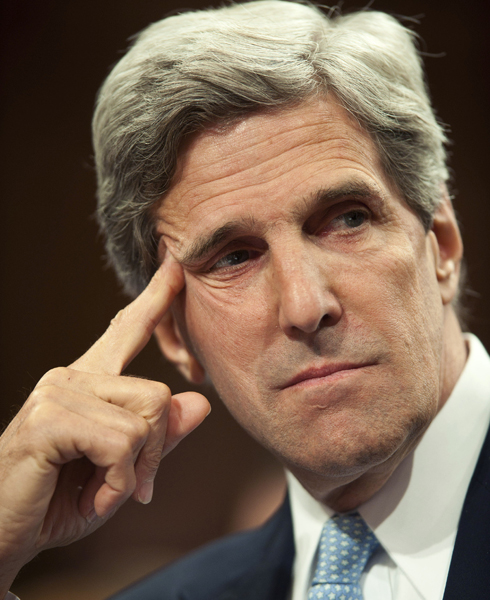With President Obama’s July deadline for withdrawing some troops in Afghanistan just weeks away, the future of the U.S. commitment to the nearly 10-year war has been a hot topic on both ends of Pennsylvania Avenue in recent weeks.
Concern over the nation’s budget woes have taken center stage in Washington, and with few tangible signs of progress in Afghanistan, members of Congress are increasingly expressing deep skepticism about maintaining U.S. nation-building efforts there.
The most notable aspect of Wednesday’s Senate Foreign Relations hearing on the nomination of Ryan Crocker to be ambassador to Afghanistan, was the absence of voices supporting an ongoing robust U.S. presence there.
In fact, all of the usual GOP suspects who have repeatedly voiced support for remaining in Afghanistan, namely Sens. James Inhofe (R-OK) and Marco Rubio (R-FL), and to a lesser extent Sen. Jim DeMint (R-SC), didn’t show up for the hearing at all.
Even Sen. John McCain (R-AZ), a longtime advocate for surging troops in both Iraq and Afghanistan who visited the hearing to introduce Crocker, kept his remarks focused on Crocker’s record in the region and refrained from advocating a position about the level of U.S. troops necessary to prevent Afghanistan from returning to a safe haven for al Qaeda and other terrorist groups.
Instead, Crocker was treated to a series of complaints and criticisms from both sides of the aisle about the war’s price-tag and the absence of major progress in the mammoth nation-building project.
The committee’s Democrats released a report Tuesday night that the nearly $19 billion in U.S. assistance to stabilize Afghanistan may, in fact, be producing the opposite effect, creating a false economy that would crumble once the U.S. and NATO forces leave. In addition, the infusion of funds is fueling corruption and undermining the Afghan government, the report found.
Foreign Relations Committee Chairman John Kerry (D-MA) said the U.S. needs to run a cost-benefit analysis of U.S. involvement.
“The current commitment in troops and dollars in neither proportional to our interests or sustainable,” he said at the hearing.
Sen. Bob Menendez (D-NJ) was more blunt, repeatedly grilling Crocker on what, if anything, he could point to as progress.
“From 2002 to 2010, we have spent $19 billion in assistance, and I know there has been a report…that this huge attempt at nation building may not survive in an American withdrawal. Is this a good use of American taxpayer dollars?” he asked.
Crocker responded that the U.S. has helped seven million children in the country receive an education, including two million girls, and has established the provision of basic health services.
“What I would tell you senator, I am committed to ensuring that the assistance we provide, A, makes an important positive difference, and B, can be implemented, and C, can be sustained,” he said.
Menendez said he agreed that educating children and establishing basic healthcare are successes, although he said he’s “not sure it’s $19 billion worth.”
“I hope you look at [the role of ambassador] as a fiduciary for the American taxpayer,” he added. “As senators, we’re fiduciaries and right now I don’t think we are being good fiduciaries to the American taxpayer.”
Aside from Sen. Dick Lugar (R-IN), the ranking member of the committee, Sen. James Risch (R-ID) was one of only a handful of Republicans to show up for the hearing, and even then he said he shared the frustration already expressed by the panel’s Democrats.
“I share a lot of the skepticism that is expressed here this morning,” he said. “This is a messy situation that isn’t getting any better.”
In his opening remarks and throughout the hearing, Crocker repeatedly said the U.S. can’t afford to abandon the region and let terrorists regain a haven for plotting attacks, and he reminded the senators of the rise of the Taliban after the U.S. abruptly stopped channeling money to the country in 1989 after the Mujahideen successfully pushed out the then-Soviet Union’s military.
“The United States is not walking away from the region,” Crocker said. “We will not repeat the mistakes of the past.”
President Obama said Tuesday he would make a decision about how many troops to withdraw “soon,” and he spoke to Afghanistan President Karzai for roughly one hour by videoconference Wednesday morning, although a White House readout of the call did not mention the upcoming withdrawal.
During Wednesday’s briefing, White House spokesman Jay Carney pointed reporters to that remark, noting that there is no specific deadline right now.
“July has 31 days in it,” he said.
When asked about the Senate Foreign Relations Committee report, Carney said the White House welcomed it even though the President and administration officials are well aware of the problems in Afghanistan.
“We are very clear-eyed about the challenges in Afghanistan….about the progress that has been made and the setbacks we have experienced at various times,” he said.









